-

人教版高中历史必修2二战后苏联的经济改革教案
⑤强调对外关系的灵活性。戈尔巴乔夫指出在对外政策中要采取多种办法选择不同的策略路线达到既定目标。在外交谈判中不要为自己制造死胡同,也不要给对方制造死胡同,要善于迎合伙伴,寻求接触点。在这种思想指导下,苏共采取的对外战略是以军控为中心的缓和战略,具体政策是继续与美国就裁军、消减核武器、限制地区冲突等问题进行谈判,缓解苏美关系;对西欧争取建立“全欧大厦”;对东欧实行纠偏、不干涉政策;对中国改善关系,实现关系正常化;调整与第三世界国家关系,解决阿富汗、柬埔寨等问题。 3、影响:①经济改革措施仓促上马,缺少宏观决策和相应的配套措施;加上戈尔巴乔夫没有放弃苏联的传统做法,继续优先发展重工业,致使改革未达到预期的效果,苏联经济持续下滑②经济体制改革受挫后,把改革的重点转向政治领域,最终导致国内局势的失控和苏联的解体。

人教版高中历史必修2空前严重的资本主义世界经济危机教案
在美国历史上,很少有像胡佛那样受到老百姓讽刺、憎恶的总统。用破铁罐、纸板和粗麻布搭起来的棚户叫做“胡佛村”,手里提着的装破烂的口袋叫做“胡佛袋”,乡下的贫民把破汽车前部锯掉,套上骨瘦如柴的骡子,叫做“胡佛车” ,在公园长凳上躺着过夜的人用旧报纸裹身取暖,叫做“胡佛毯”,衣袋翻过来,一个钱也找不到,叫做“胡佛旗”,野兔被饥饿的农民抓来吃,叫做“胡佛猪”。杂耍演员插科打诨说:“什么?生意好起来了吗,你的意思是说胡佛死了吧。”★教学反思:本课内容比较条理清楚,旨在说明罗斯福新政实施的背景。备课时考虑将课文顺序进行一下调整,使学生能从较直观的危机的现象进入本课,较易激发学生的兴趣,再来分析原因学生也就比较容易接受。在分析原因时通过材料和课文的阅读,使学生自己通过思考逐步得出结论。而关于胡佛政府的措施的讲述,及问题的提出则可让学生先进行预习,为下一课进入罗斯福新政的学习做好准备。多媒体课件的应用也能使教学活动顺利流畅的进行。

人教版高中历史必修2战后资本主义的新变化教案2篇
1、知识与能力:(1)识记:20 世纪 50 ~70 年代国家干预经济的政策、 70年代的经济“滞胀”“混合经济”;福利国家;第三产业的蓬勃发展;“新经济”的出现;(2)理解当代资本主义的新变化的实质是资本主义的自我扬弃,是在资本主义内部的自我改善,是资本主义生产关系的自我调整;(3)掌握以美国为代表的主要资本主义国家在战后的经济发展历程,分析各国经济发展的共同原因。2、过程与方法:(1)引导学生利用教材和相关史料,培养归纳、再现历史事件的能力,提高学生的历史思维能力;通过讨论提高学生的思辨能力,培养学生全面客观地分析问题的思维方式。(2)学生通过观察1977年发达国家国有经济比重表,懂得提取有效信息、分析数据的能力;(3)学生通过思考讨论西方福利制度的利弊,培养全面、客观分析和比较历史现象,辩证地观察和分析历史问题的能力。

人教版高中历史必修2殖民扩张与世界市场的拓展教案
●活动与探究从葡萄牙、西班牙、荷兰的兴衰历程,从英国的强盛历程,我们从中可获得什么启示?启示:积极发展本国的工商业;实现制度创新;抓住机遇,及时更新观念;建立能保障自身经济顺利发展的国防力量,尤其是海军力量;积极发展海外贸易,实行对外开放……★本课小结16世纪后期荷兰积极向海外殖民扩张,在17世纪建立了世界范围内的殖民帝国;17世纪开始,英国也积极向海外殖民扩张,并与荷兰、法国进行了激烈的争夺,到18世纪中期,英国成为世界上最大的殖民国家,最终确立了世界殖民霸权;新航路开辟后,伴随着殖民扩张,人类的商业活动开始在全球范围内开展,人类的经济活动由于世界市场的出现而第一次被广泛地联系在一起,而西欧国家对殖民地财富、资源、劳动力的暴力掠夺,是欧洲发展和兴旺的重要条件,也是亚、非、拉美灾难的根源。
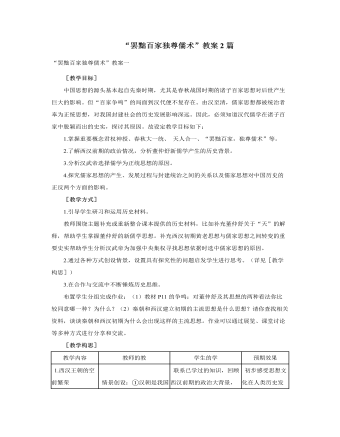
人教版高中历史必修3“罢黜百家独尊儒术”教案2篇
战国阴阳五行家邹衍认为,历史中的朝代更替是由于五德运行产生的影响。按照邹衍的学说,每个朝代必须与五德之一相连,因此,这个朝代就应当遵循这五德之一的要求来运转。董仲舒修改了这个理论,认为朝代的更替不是依循五德运行的顺序,而是依循“三统”,即黑统、白统、赤统的顺序。他在《三代改制质文》中说:每个朝代都依循一统,每统又各有其为政的系统。按董仲舒的说法,夏朝代表黑统,商朝代表白统;周朝则是赤统。夏、商、周三朝完成了这一历史循环。之后,历史又开始一次新的循环,新的朝代又应当代表黑统。继承周朝统治的既不是秦朝,也不是汉朝,而是孔子,他承受天命,创立了黑统。孔子所受天命,不是一种“法统”,而是一种“道统”。董仲舒说:“《春秋》大一统者,天地之常经,古今之通谊也。今师异道,人异论,百家殊方,指意不同,是以上亡以持一统;法制数变,下不知所守。臣愚以为诸不在六艺之科孔子之术者,皆绝其道,勿使并进。邪辟之说灭息,然后统纪可一而法度可明,民知所从矣。”

人教版高中历史必修3从“师夷长技”到维新变法教案
4、维新思想推动下的变法运动虽然失败了。但这是中国近代真正意义上的一次思想解放潮流,为什么?展开:维新派提倡西学,兴民权,对封建专制制度和传统观念进行了冲击,促进了中国人民的觉醒,为资产阶级民主思想的传播奠定了基础,具有思想解放的启蒙作用。是一次救亡图存的爱国运动,也是一次发展资本主义的改革运动;他们提倡资产阶级新学,批判封建主义旧学,引导人们重新认识世界,他们痛感民族危机的严重,号召人们奋起救国,谋求国家的独立富强;给古老的中国社会注入的活力是不可低估的,站在历史长河的高度看,由传统农耕社会向近代工业社会转变是一股不可抗拒的历史潮流,尽管它在19世纪末的中国遭到了暂时挫折,但对清朝的封建专制统治却是一次巨大的强烈的冲击波,它留下的痕迹是永不磨灭的,是永远鼓舞与启迪后人的。

人教版高中历史必修3建国以来的重大科技成就教案
思考:1)材料1、2反映了一个什么样的严重问题?(饥饿和粮食问题)2)材料3中,中国农民为什么那样说?(邓小平在全国实行的以家庭联产承包责任制为主要形式的责任制调动了农民生产的积极性,解放了农村生产力,推动了农业的发展;袁隆平的杂交水稻提高了水稻产量,增加了农民的收入,解决了农民的吃饭问题)3)据以上材料指出,袁隆平研究的交水稻有何重大意义?(杂交稻不仅解决了中国人的吃饭问题;而且其在世界范围的推广,也有助于解决世界性的饥饿问题)四、计算机技术与生物技术的发展1、20世纪50年代,我国开始了计算机的研制工作;2、1983年,我国成功研制出巨型计算机“银河-Ⅰ号”,加速了国家信息化的发展;3、1965年,中国首次人工合成结晶牛胰岛素(在世界上第一次用人工方法合成出具有生物活性的蛋白质——结晶牛胰岛素) 。4、积极参与人类基因的研究(唯一的发展中国家)。
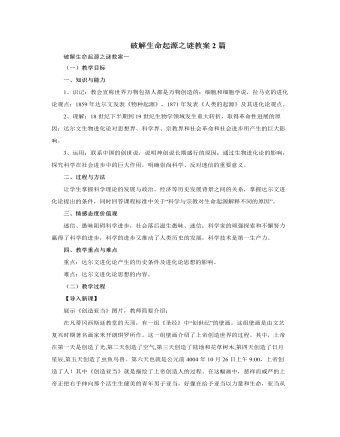
人教版高中历史必修3破解生命起源之谜教案2篇
设问:你怎么看待这个问题的?(这是达尔文没有想到的,是有人利用了达尔文的学说,科学应该与其区分开来,但是科学家在研究时,既要做到为追求真理不断探索,又要有一定的人文精神,比如我们只有以人为本,才能找到解决当今社会面临的诸如环保、战争、饥荒等问题的途径,才能构建防止核物理技术、克隆技术、信息技术、生物技术、太空技术等可能对人类造成不可逆转的破坏作用的思想基础、决策机制和社会条件。更重要的是社会和国家应该对此有足够的认识,正因为此,所以现在当一项科学发明出台后,就会有一些法律出台,限制其可能的非人道用途。但是这些影响应不成为我们进行科学探究的阻碍。)(3)科学与宗教的斗争设计意图:再次引导学生认识,科学的探索永无止境,同时也再次认识宗教和科学理论产生的原因。材料1:1972年,美国加利福尼亚教育部竟明文规定,中学生物学课本除进化论外,必须还有神创论的内容,而且两者的页数要各占一半。

新人教版高中英语必修1Unit 1 Teenage Life-Listening and Speaking & Listening and Talking教案
Step 2 Listening and Talking1. The teacher is advised to talk with their new students about the related topic: Boys and girls, do you know some structures to talk about future activities? Talking about future activitiesWe’ll …I plan to …There’ll be …I hope to …We’re going to …2. After their small talk, the teacher can move on by playing the listening and solve the following task.Underline the expressions in the sentences below Cao Jing and Max use to talk about the future.We’ll learn useful skills.I plan to improve my spoken English.There’ll be students from different schools.I hope to make new friends.We’ll talk about teenage life.I’ll learn to make a fire.There’ll be students from different countries at the camp.There’ll be some experts there to show us how to live in the wild.We’re going to learn about wildlife.I’m going to give a speech.I think I’m going to enjoy the activities.I think we’ll have a lot of fun.3. Work in groups. Plan a youth camp.Teacher make the Ss think of ideas for the camp. And they can use the questions below to get started. And have the Ss present their ideas for a youth camp to the class.●What kind of camp is it?●Who will be there?●What will they do?●What will they learn?

新人教版高中英语必修1Unit 2 Travelling Around-Listening and Speaking & Listening and Talking教案
【教学目标与核心素养】1. Instruct students to get main facts by listening and motivate them to talk about the topics about how to prepare for the trip and make reservations by listening and ultimately can make travel arrangements and reservations. 2. Develop students’ sense of cooperative learning and individual thinking capability. 3. Develop students’ different listening skills to solve different listening comprehensive problems.4. Help students to understand how to use the structures “the present continuous tense (be doing) is used to express future plans.【教学重难点】1. Teach students how to focus on key words, not on single words or grammar.2. Prompt Ss to talk about the related topics, such as how to prepare for the trip and make a travel plan.【教学过程】Step 1: Listening and SpeakingLead inThe teacher is advised to talk with their students about the places that they want to travel most both at home and abroad: boys and girls, if you have a chance to travel around the world, where will you go? After their small talk, the teacher can move on by finishing the following listening task:Before travelling, what do we need to prepare for the trip?

新人教版高中英语必修3Unit 1 Festivals and Celebrations-Reading and Thinking教学设计
The topic of this part is “Discover the reasons for festivals and celebrations.The Listening & Speaking & Talking part aims at talking about the experiences and feelings or emotions about the festivals and celebrations. This section aims at detecting the reason why the people celebrate the festivals, the time, the places, the types and the way of celebrations. It also explains why some traditions in the old celebrations are disappearing, like the firecrackers in the big cities and some new things are appearing like the prosperity of business or commerce. 1. Students can talk about what festivals they know and the reasons and the way of celebrating them.2. Students should learn the reading skills such as the headline and get the topic sentences, the structures of articles.3. Students can understand the past, the present situation of some festival around the world and why there are some changes about them. 4. Students can have the international awareness about the festivals.1. Students should learn the reading skills such as the headline and get the topic sentences, the structures of articles.2. Students can understand the past, the present situation of some festival around the world and why there are some changes about them.Step 1 Lead in---Small talkWhat festival do you like best ? Why ?I like the Spring Festivals because I can set off the fireworks, receive the lucky money and enjoy the Gala with my families.Step 2 Before reading---Pair workWhy do people celebrate different festivals ?The Spring Festivals is to celebrate the end of winter and the coming of spring and new life.The Mid-autumn Day is to celebrate the harvest and admire the moon.

新人教版高中英语必修3Unit 1 Festivals and Celebrations-Listening &Speaking&Talking教学设计
The theme of this section is “Talk about festival activities and festival experiences”.Festival and holiday is a relaxing and interesting topic for students. This part talks about the topic from the daily life of students’. In the part A ---Listening and Speaking, there are three conversations among different speakers from three countries(Japan, Rio and China), where the speakers are participating in or going to participate in the festivals and celebrations. So listening for the relationship among them is a fundamental task. Actually, with the globalization and more international communication, it is normal for Chinese or foreigners to witness different festivals and celebrations in or out of China. In the Conversation 1, a foreign reporter is interviewing a Japanese young girl who just had participated in the ceremony of the Coming-of-Age Day on the street and asking her feeling about the ceremony and the afterwards activities. Conversation 2, Chinese girl Li Mei is witnessing the Rio Carnival for the first time, and her friend Carla gives her some advice on the costumes which enables her to match with the carnival to have a good time. Conversation 3, a Chinese guide is showing a group of foreign visitors around the Lantern Festival and introducing the customs of the festival to them. The three conversations have a strong vitality and insert the festival and cultural elements from different countries. So perceiving the festivals and cultures from different countries is the second task. At the same time, the scripts also insert the targeted grammar --- v-ing as attributive and predicative, which students can perceive and experience in a real context and make a road for the further study. That is the third task. In the Part B--- Listening and Talking, the theme is “Talk about festival experience”, which is the common topic in our daily conversations. During the conversation, Song Lin, a Chinese student, asked Canadian friend Max about how to spend Christmas. In the conversation, Song Lin talked about experience and the feelings during the Chinese Spring Festival, during which there are not only some enjoyable things but some unpleasant things. After the listening, perhaps students find there are some similarities between Christmas and the Chinese Spring Festival as there are some differences in the origins and celebrations. For example, people always visit friends and relatives, decorate their houses, have a big dinner together, chat and give presents to each other.

新人教版高中英语必修3Unit 2 Morals and Virtues-Discovering Useful Structure教学设计
1. 表示时间。Hearing these stories, I’m skeptical about the place. = When I heard these stories. . . 2. 表示原因。Not knowing his address, I can’t send this book to him. = Because/Since/As I don’t know his address. . . 3. 表示结果。His father died, leaving him a lot of money. =. . . and left him a lot of money4. 表示条件。Going straight down the road, you will find the department store. = If you go straight down the road. . . 5. 表示让步。Being tired, they went on working. =Although they were tired. . . 6. 表示行为方式、伴随情况或补充说明。He lay on the grass, staring at the sky for a long time. =. . . and stared at the sky for a long time注意:非谓语动词作状语时, 如所提供的动词不能和句子中的主语保持一致, 动词-ing形式必须有自己的逻辑主语, 通常由名词或代词来担任, 这就是独立主格结构。The last bus having gone, we had to walk home. (having gone的逻辑主语是the last bus, 而不是we)Weather permitting, the football match will be played on Friday. (permitting的逻辑主语是time, 而不是the football match)Step 7 Practice1. ________(study) hard, you are sure to get first prize. 2. People use plastic in their daily life, _______(leave) large amounts of waste. 3. ________(work) hard at your lessons, you are to succeed. 4. The old man, ____________(work) abroad for twenty years, is on the way back to his motherland. 5. ______________(finish) his homework, he was playing on the playground. Answers: 1. Studying 2. leaving 3. Working 4.having worked 5. Having finishedStep 8 HomeworkFinish the homework on Page 22.

新人教版高中英语必修3Unit 3 Diverse Cultures-Discovering Useful Structure教学设计
Step 4 PracticeRead the conversation. Find out which words have been left out.Justin: Linlin, I’m going to Guizhou Province next month. I’m super excited! Any recommendations for places to visit?Linlin: Wow, cool! Guizhou is a province with a lot of cultural diversity. Places to visit...well, definitely the Huangguoshu Waterfall first.Justin: What’s special about the waterfall?Linlin: Well, have you ever heard of the Chinese novel Journey to the West ?Justin: Yes, I have. Why ?Linlin: In the back of the waterfall, you will find a cave, which is the home of the Monkey King.Justin: Really? Cool! I’ll definitely check it out.Linlin:And I strongly recommend the ethnic minority villages. You’ll find Chinese culture is much more diverse than you thought.Justin:Sounds great, thanks.Answers:Justin: Linlin, I’m going to Guizhou Province next month. I’m super excited! Do you have any recommendations for places to visit?Linlin: Wow, that’s cool! Guizhou is a province with a lot of cultural diversity. What are some places to visit in Guizhou ? Well, definitely the Huangguoshu Waterfall is the first place to visit in Guizhou Province.Justin: What’s special about the waterfall?Linlin: Well, have you ever heard of the Chinese novel Journey to the West ?Justin: Yes, I have heard of the Chinese novel Journey to the West . Why do you ask if I have heard of the Chinese novel Journey to the West?Linlin: In the back of the waterfall, you will find a cave, which is the home of the Monkey King from Journey to the West.Justin: That’s really true? It’s Cool! I’ll definitely check it out.Linlin:And I strongly recommend the ethnic minority villages on your trip to Guizhou Province. You’ll find Chinese culture is much more diverse than you thought it was.Justin:This all sounds great, thanks.

新人教版高中英语必修3Unit 3 Diverse Cultures-Reading and Thinking教学设计
Discuss these questions in groups.Q1: Have you ever been to a place that has a diverse culture ? What do you think about the culture diversity ?One culturally diverse place that I have been to is Harbin, the capital city of Heilongjiang Province. I went there last year with my family to see the Ice and Snow Festival, and I was amazed at how the culture as different to most other Chinese cities. There is a big Russian influence there, with beautiful Russian architecture and lots of interesting restaurants. I learnt that Harbin is called “the Oriental Moscow” and that many Russians settled there to help build the railway over 100 years ago.Q2: What are the benefits and challenges of cultural diversity ?The benefits: People are able to experience a wide variety of cultures, making their lives more interesting, and it can deepen the feelings for our national culture, it is also helpful for us to learn about other outstanding culture, which helps improve the ability to respect others. The challenges: People may have trouble communicating or understanding each other, and it may lead to disappearance of some civilizations and even make some people think “The western moon is rounder than his own.”Step 7 Post reading---RetellComplete the passage according to the text.Today, I arrived back in San Francisco, and it feels good (1) _____(be) back in the city again. The city succeeded in (2)_________ (rebuild) itself after the earthquake that (3)________ (occur) in 1906, and I stayed in the Mission District, enjoying some delicious noodles mixed with cultures. In the afternoon, I headed to a local museum (4)____ showed the historical changes in California. During the gold rush, many Chinese arrived, and some opened up shops and restaurants in Chinatown to earn a (5)_____ (live). Many others worked on (6)______ (farm), joined the gold rush, or went to build the railway that connected California to the east. The museum showed us (7)____ America was built by immigrants from (8)________ (difference) countries and cultures. In the evening, I went to Chinatown, and ate in a Cantonese restaurant that served food on (9)________(beauty) china plates. Tomorrow evening, I’m going to (10)__ jazz bar in the Richmond District. 答案:1. to be 2. rebuilding 3. occurred 4. that 5.living6. farms 7.how 8. different 9. beautiful 10. a

新人教版高中英语必修3Unit 5 The Value of Money-Listening &Speaking教学设计
Step 4: Listen again and decide if the following statements are true (T) or false (F).1 It was the first time Chen Liyan's story was reported. T口 F口2 Chen found 10,000 yuan in a small plastic bag in Taiyuan railway station口 F口3 Wang Zheng apologized to Chen because he couldn't offer her more money. T口 F口4 Chen took out a large loan to cure her daughter, T口 F口5 Wang set up a fundraising website for Chen's daughter after Chen told him about her situation. T口 F口Step 5:After listening, discuss the questions.1 What kind of person do you think Chen Liyan is?Chen Liyan is generous and honest because she returned a large sum of money to the owner.2 Did Chen return the money because she didn't need it?No. She returned the money because it was the right thing to do. Evidence for this is that she refused to accept the reward money because she felt that it had not been earned. 3 Is it common for people to do what Chen did?It depends on the culture. In some countries it is quite common to return money that has been found. In other countries, people believe "Finders are keepers!" 4 How did Wang Zheng feel about the return of his money?He must have been very happy and relieved to have gotten his money back. We know this because he thanked Chen repeatedly and even offered her a reward.5 Why did Ma Dongbao tell Wang about Chen's family?He must have had great sympathy for Chen and her daughter and wanted to help them.'We know this because he arranged help for them. 6 How did the news reporter feel about Chen's actions?The news reporter felt that it showed that money wasn't the most important thing in life. We know this because the reporter told us that this is what Chen believes. and then said, “that's a great attitude to take."

新人教版高中英语必修3Unit 5 The value of money-Reading and Thinking教学设计二
? Could you offer me some kind of work here?? I don’t want your charity, I just want an honest job.? Careless: I landed in Britain by accident.Step 7:Consolidation.? Find Henry? Roderick and Oliver were I .making a bet when they saw Henry, a poor young man. ? Know Henry? About a month ago, Henry was sailing and later he found himself carried out to sea by a strong wind. Fortunately, he 2.was spotted by a ship. And it was the ship that brought him to 3.England? Offer money to Henry ? Oliver and Roderick gave Henry a letter and told him that there was money in it. They 4.persuaded him to accept it, and made him 5.promise that it wouldn't be opened until 2 o'clock.Step 8:Language pointsa large amount of: a large quantity of; a great deal ofe.g. They bought a large amount of furniture before they moved their new house.make a bet: make an arrangement to risk money, etc. on an event of which the result is doubtful.e.g. We made a bet on the result of the match.permit sb to do something: allow somebody to do somethinge.g. My mother doesn’t permit me to ride in the street after it rained.by accident: as a result of chancee.g. I only found it by accident.stare at: look at somebody or something with the eyes wide open in a fixed gaze( in astonishment, wonder, fear, etc)to be honest: to tell you the truth; to be franke.g. To be honest, I don’t think we have a chance of winning.Step7 Homework:What do you think will happen to Henry? Will the bank-note help him or get him into trouble?
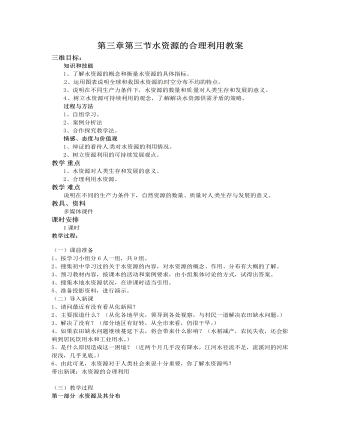
人教版高中地理必修1第三章第三节水资源的合理利用教案
5、请列举开源的措施。(包括合理开发和提取地下水;修筑水库;开渠引水实行跨流域调水;海水淡化;人工增雨等。6、开源“五水”歌:开发地下水、蓄积洪水,跨流域调水,淡水海水,人增雨水。能马上背出来吗?7、请列举节流的措施。(包括加强宣传教育,提高公民节水意识;重视改进农业灌溉技术,提高工业用水的重复利用率等。)8、水资源时刻影响着我们的生存和发展,尽管我们已经学习了关于如何合理利用水资源的知识,但关键还是要研究问题和解决问题,面对复杂的生活环境,具体问题要具体分析,看课本70页“活动”,请小组派代表回答问题。提示:(1)西北地区的水资源供给,从可持续发展的角度,解决水资源的供求矛盾应体现在:控制人口数量,减少用水规模;发展节水农业;保护生态环境,退耕还林还草。(2)我国缺水问题,谈谈看法:通过电视、报纸杂志、互联网收集有关水资源的资料;确定综合思维、立体思维的方法,全面多角度地寻找解决缺水的对策。
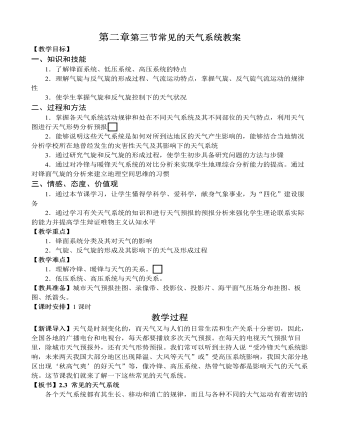
人教版高中地理必修1第二章第三节常见的天气系统教案
一、知识和技能1.了解锋面系统、低压系统、高压系统的特点2.理解气旋与反气旋的形成过程、气流运动特点,掌握气旋、反气旋气流运动的规律性3.使学生掌握气旋和反气旋控制下的天气状况二、过程和方法1.掌握各天气系统活动规律和处在不同天气系统及其不同部位的天气特点,利用天气图进行天气形势分析预报2.能够说明这些天气系统是如何对所到达地区的天气产生影响的,能够结合当地情况分析学校所在地曾经发生的灾害性天气及其影响下的天气系统3.通过研究气旋和反气旋的形成过程,使学生初步具备研究问题的方法与步骤4.通过对冷锋与暖锋天气系统的对比分析来实现学生地理综合分析能力的提高。通过对锋面气旋的分析来建立地理空间思维的习惯三、情感、态度、价值观1.通过本节课学习,让学生懂得学科学、爱科学,献身气象事业,为“四化”建设服务
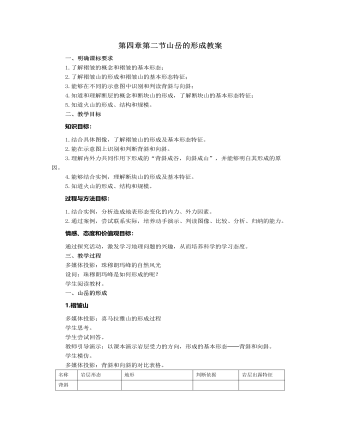
人教版高中地理必修1第四章第二节山岳的形成教案
一、明确课标要求1.了解褶皱的概念和褶皱的基本形态;2.了解褶皱山的形成和褶皱山的基本形态特征;3.能够在不同的示意图中识别和判读背斜与向斜;4.知道和理解断层的概念和断块山的形成,了解断块山的基本形态特征;5.知道火山的形成、结构和规模。二、教学目标知识目标:1.结合具体图像,了解褶皱山的形成及基本形态特征。2.能在示意图上识别和判断背斜和向斜。3.理解内外力共同作用下形成的“背斜成谷,向斜成山”,并能够明白其形成的原因。4.能够结合实例,理解断块山的形成及基本特征。5.知道火山的形成、结构和规模。过程与方法目标:1.结合实例,分析造成地表形态变化的内力、外力因素。2.通过案例,尝试联系实际,培养动手演示、判读图像、比较、分析、归纳的能力。